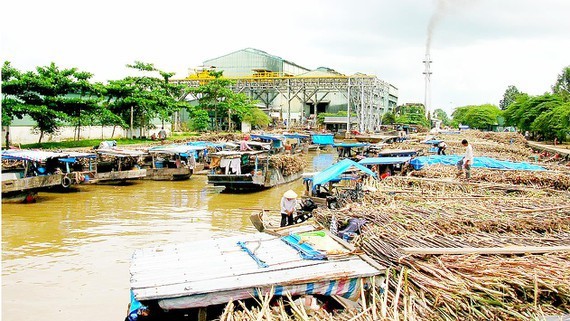
Preliminary statistics in 2020 show that Vietnam had a deficit of about 900,000 tons of sugar, the highest level in history after joining the ATIGA.
The domestic sugar output was excessive; sugar refineries had high inventory, so they had to sell a part of refined sugar at a loss, below the production costs. In the fields, sugarcane farmers across the country could not sell their products or had to sell sugarcane at prices lower than those under consumption contracts. Slow domestic sugar consumption is said to be the consequence of the amount of sugar imported into Vietnam showing signs of dumping. Right from January last year, when the ATIGA had just come into effect, domestic sugar prices stood still, while the global ones hit a record. Thailand, the world's fourth-largest sugar producer and the largest in the ASEAN, exported sugar to Vietnam at prices lower than the prices of sugarcane produced in Thailand. Data from Thailand’s Office of the Cane and Sugar Board (OCSB) shows that, in the first seven months of last year, this country had exported a large amount of sugar to Vietnam at US$364.6 per ton. This price is not only cheaper than the selling price of sugar at $732 per ton in the domestic market of Thailand, listed in September last year, but also lower than the sugarcane price of $410 per ton for sugar production. It is because of the subsidy of the Thai Government, with a 10 billion baht ($317 million) support package for its sugar industry, causing Vietnamese sugar to be squeezed price right in the home ground.
According to economic experts, the competitiveness of Vietnam's sugar industry is not inferior to other countries in the ASEAN if it is brought to the same condition as other countries. As for the unreasonable trade environment, Vietnam is forced to apply trade remedies suitable for Vietnam's sugar industry to change positively. Therefore, trade defense tax is considered to be the most feasible tool to protect Vietnam's sugar industry at this moment. The trade defense tax applied properly, timely, and legally will help the Vietnamese sugar industry maintain production and gradually develop in the market economy.
The domestic sugar output was excessive; sugar refineries had high inventory, so they had to sell a part of refined sugar at a loss, below the production costs. In the fields, sugarcane farmers across the country could not sell their products or had to sell sugarcane at prices lower than those under consumption contracts. Slow domestic sugar consumption is said to be the consequence of the amount of sugar imported into Vietnam showing signs of dumping. Right from January last year, when the ATIGA had just come into effect, domestic sugar prices stood still, while the global ones hit a record. Thailand, the world's fourth-largest sugar producer and the largest in the ASEAN, exported sugar to Vietnam at prices lower than the prices of sugarcane produced in Thailand. Data from Thailand’s Office of the Cane and Sugar Board (OCSB) shows that, in the first seven months of last year, this country had exported a large amount of sugar to Vietnam at US$364.6 per ton. This price is not only cheaper than the selling price of sugar at $732 per ton in the domestic market of Thailand, listed in September last year, but also lower than the sugarcane price of $410 per ton for sugar production. It is because of the subsidy of the Thai Government, with a 10 billion baht ($317 million) support package for its sugar industry, causing Vietnamese sugar to be squeezed price right in the home ground.
According to economic experts, the competitiveness of Vietnam's sugar industry is not inferior to other countries in the ASEAN if it is brought to the same condition as other countries. As for the unreasonable trade environment, Vietnam is forced to apply trade remedies suitable for Vietnam's sugar industry to change positively. Therefore, trade defense tax is considered to be the most feasible tool to protect Vietnam's sugar industry at this moment. The trade defense tax applied properly, timely, and legally will help the Vietnamese sugar industry maintain production and gradually develop in the market economy.
























